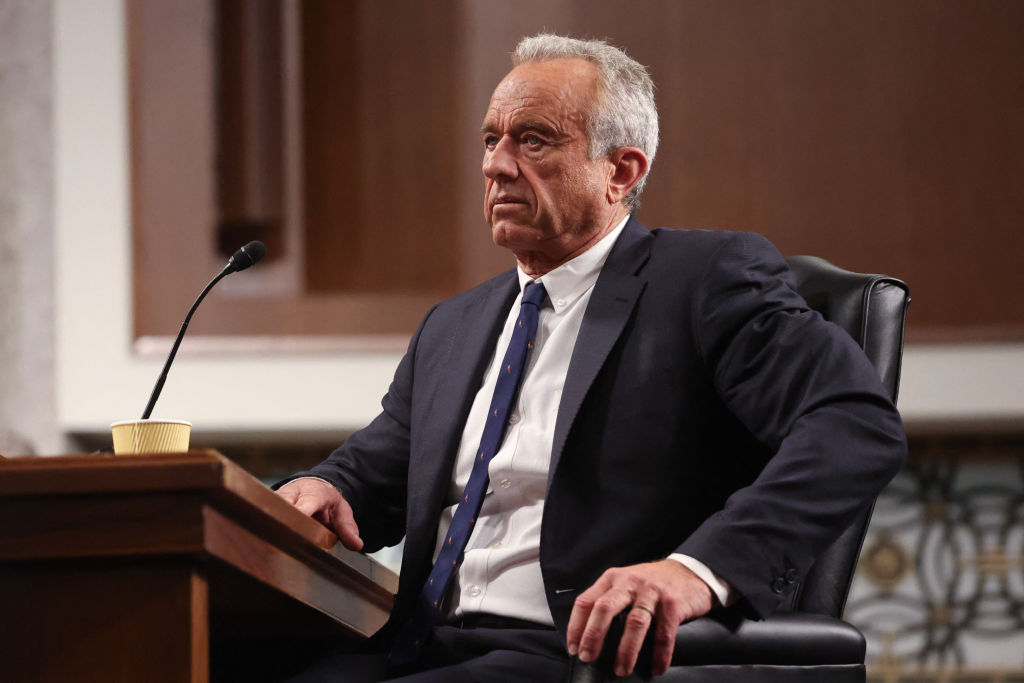This article is in
The Spectator’s November 2019 US edition. Subscribe here.
How did Elizabeth Warren, a left-wing populist, become the candidate of Democrats who dislike left-wing populism? Why is it fine for Warren to menace the rich — but not for Bernie Sanders? With some polls placing her ahead of the former vice president Joe Biden, the Massachusetts senator is suddenly basking in praise from mainstream newspapers as well as ‘progressives’ like Emily Tisch Sussman, a ‘Democratic strategist’ who appears regularly on MSNBC.
Led by its star hosts, Chris Matthews and Rachel Maddow, MSNBC functions as the mouthpiece of an official Democratic party still dominated by the Clintons and Barack Obama. ‘If you are still supporting Sanders as opposed to Warren,’ said Sussman recently, ‘it’s kind of showing your sexism.’
Besides being a courageous feminist, Sussman happens to be the daughter of two billionaires. She seems unafraid of Warren’s plan to increase taxes on the super-rich. Warren ticks all the boxes marked ‘progressive’ that used to belong mostly to Sanders. She is unequivocally in favor of impeaching Donald Trump, tough on Wall Street and keen to break up monopolies and concentrated wealth. Yet she doesn’t frighten the establishment in the way that Sanders does.
The reason is that, so far in her career, Warren has proven to be a reliable party loyalist, never an insurgent. Her ‘private’ conversations with Hillary Clinton, reported by NBC News, are another good example of how the former Harvard law professor makes nice to the bigwigs she claims to be fighting. In fact, it’s no secret that Warren wants to appease a party oligarchy that is determined to crush Sanders, the genuine insurgent and the genuine radical. Maybe she’s more like Hillary than anyone dares to say out loud. When the two women talk on the phone, as they do, maybe it’s more about power than about good government.
Warren now travels the country speaking of ‘revolution’, but has taken pains to reassure Democratic barons that she’s not even a boat rocker. The barons hope that, following Sanders’s heart attack, he will fade while Warren scoops up his supporters and Biden stumbles on. For a party torn between its mega-rich donors (cultivated by the Clintons and Obama) and a base that is increasingly left-wing, Warren seems a happy compromise. She has become the consensus choice, assuming Biden continues his incoherent ways and the party is forced to drop him.
If you want to understand that consensus, study the New York Times and the Washington Post. These two bastions of elite liberal thinking like Warren. They might have preferred Kamala Harris, but Kamala’s campaign fizzled. For them, Warren is infinitely preferable to Sanders, whom they have spent the last four years attacking. The Times plays the role of Pravda for the Democrats, acting as party megaphone and advance guard. National correspondent Jonathan Martin wrote a piece earlier this year headlined ‘What Elizabeth Warren is quietly telling Democratic insiders’. She said it so ‘quietly’ that her campaign encouraged the Times to broadcast her message for the world to hear: ‘While her liberal agenda may be further left than some in the Democratic establishment would prefer, she is a team player who is seeking to lead the party — not stage a hostile takeover of it,’ wrote Martin. Translation: when push comes to shove, Warren will put party above principle.
With an impeachment inquiry underway, Warren also finds herself in the mainstream of party tactics. For the first time, lion-like party hacks could lie down with lamb-like lefties in a group effort to hurl the evil and corrupt Trump from office. In a wink, the proponent of a special wealth tax on the 75,000 richest Americans looks quite respectable, even, apparently, to some Democrats belonging to that class. As the economist Paul Krugman, the tribune of university-sanctioned liberalism, admiringly put it, the super-rich ‘can try to brush off someone like Bernie Sanders as a rabble-rouser’, whereas, ‘When Warren criticizes malefactors of great wealth and proposes reining in their excesses, her evident policy sophistication (has any previous candidate managed to turn wonkiness into a form of charisma?) makes her critique much harder to dismiss.’
For the record, Warren, like Clinton, used to be a registered Republican. It wasn’t until 1996 that, aged 47, she changed her affiliation to Democrat. Some friends say she had a ‘road to Damascus’ moment, others say she slowly converted from ‘moderately conservative’ to ‘moderately liberal’. Whatever the case, nowadays Warren talks a good game on trade, the danger of concentrated wealth and the importance of equal opportunity in education. She’s sincere, too: nobody can read her book The Two-Income Trap without thinking she means what she writes.
But Hillary also had convictions — and look how she turned out. As a Democrat, Warren has always respected party protocol. She’s been eager to stress that she has no desire to seize control of the party machinery, which ensures the trains carrying money and patronage jobs run on time. She even signed a ‘pledge’ authored by the Association of State Democratic Committees not to poach on their turf with a supra-party organization of her own. This is precisely the sin Bernie Sanders and his allies committed by creating a national non-profit advocacy organization, Our Revolution, which competes directly with the Democratic National Committee and its 50 state counterparts. When Sanders talks about revolution, he really means it. He not only wants to live at 1600 Pennsylvania Avenue, he also intends to place his proxies at DNC headquarters at 430 South Capitol Street. With Liz, who knows? It might be Chelsea at the helm.
Perhaps Warren really believes she can sneak one past the party gatekeepers — the John Podesta/Rahm Emanuel-type guard dogs who enforce party discipline. Perhaps she believes she can transform the Democrats from the inside. She wouldn’t be the first. Look at Howard Dean, the former Democratic governor of Vermont who in 2003 ran for president against his party’s and Hillary Clinton’s majority support for George W. Bush’s invasion of Iraq. Dean was destroyed and humiliated by concerted party and media sabotage; ever since he has functioned as a faithful party member. He even endorsed Clinton over Sanders in 2015.
An old state rival of Sanders, Dean was also trying to overcome his apostasy. But nothing will satisfy the guard dogs once you’ve strayed off the reservation. After he was driven from the race in 2004, Dean fought to become chairman of the DNC in 2005. Despite an effective reign that culminated in Obama’s election as president, Dean was passed over for a cabinet position, which he richly deserved. No spoils for a spoiler.
Warren would likely get the same treatment as Dean if Biden survives his own ineptitude (not to mention the embarrassment of his and his son Hunter’s possible corruption) and gets the nomination. If so, it might be no worse than she deserves. Despite numerous entreaties to run against Hillary in 2016, Warren declined, either from political prudence, fear, or actual respect for the idea of Clinton becoming the first woman president. When she could have lent crucial support and a feminist voice to her supposed ideological twin, Bernie Sanders, she refused.
To get a sense of the real Elizabeth Warren, it’s useful to go back to a time when Hillary Clinton was preparing her second run for president and considered the presumptive nominee. Warren was widely expected to challenge her from the left. But she didn’t. In a September 2014 interview on PBS, the veteran liberal journalist Bill Moyers did his best to draw Warren out and distinguish her from the party satraps such as Clinton and Biden. Moyers put his finger on the issue: that the party is run by a well-funded centrist, or neoliberal, free-market elite that is dangerously at odds with its old labor base. ‘To be frank,’ he told Warren, ‘Mrs Clinton, for all the admiration and respect she commands…is the embodiment of that establishment…do you think the neoliberal wing of the Democratic party can put the country back on a path away from corporate and plutocratic control?’ Warren ducked the question.
One of the most commendable aspects of Warren is her fierce but failed opposition to bankruptcy laws in the early 2000s. These laws made it harder for individuals to obtain protection from creditors, a worthy cause for the American left. Biden championed the bankruptcy bills, perhaps because the nation’s largest issuer of credit cards, MBNA, was headquartered in his home state of Delaware and had been a major contributor to his campaigns. Hillary Clinton at first resisted the new bankruptcy laws, in part because she’d discussed the issue with Warren. But Hillary eventually supported the ‘reform’. It has been suggested that Clinton’s volte-face was the reason Warren held out on endorsing Hillary in 2016. In the end, though, she did plump for Clinton, and today the two have evidently reached an understanding.
Some in the Sanders camp believe Warren cost their man the nomination and paved the way for the election of Trump, since most national polls before the Democratic convention showed Sanders winning convincingly over the Republican nominee in the general election. I wouldn’t go so far as to pin the blame on Warren — she at least withheld her endorsement of Clinton until after Sanders dropped out — but the argument is a fair one. If Warren in 2020 is profiting from Sanders’s bold run in 2016, she begins to look less like a heroine of the left and more like an opportunist. Like Hillary, she’ll do whatever it takes to secure the nomination.
This article is in The Spectator’s November 2019 US edition. Subscribe here.

























